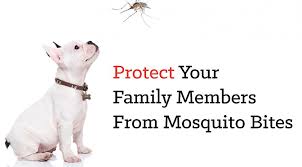How to Protect Pets from Mosquitoes
Mosquitoes and pets do not mix. Your pets are not immune to mosquito bites – they can suffer as much as you do. But when it comes to mosquito bites, pets face some risks that humans don’t. The biggest threat pets face from mosquito bites is heartworm, a potentially deadly infection. Knowing how to protect pets from mosquitoes is not just about comfort, it’s about the health of your furry friend.
Why Mosquitoes Bite
Mosquitoes generally feed on plant nectar, which is very short of protein! Female mosquitoes need protein for to develop their eggs, which they get from the blood meals they take. The blood is not food source and the mosquitoes get no nutrition from it. That’s why only females bite – the males live on nectar.
There are over 3,500 described species of mosquito, and there may be more that have not yet been cataloged by science. With so many types of mosquitoes, it is not surprising that their biting habits vary widely. There are mosquito species that attack almost every type of creature. Many mosquitoes go after mammals, but other go after birds, reptiles, and even some fish.
Unfortunately, the most common mosquitoes in the United States are all mammal-seekers. That includes humans and their pets. Mosquitoes will suck the blood of any warm-blooded animal – you, your dog, your cat, and even your horse. That’s why it’s important to keep your pets in mind with your mosquito control system.
How to Keep Pets Safe
Mosquitoes can be more than just an annoyance for your pets. Here are some mosquito control tips on how to protect pets from bites.
Keep Pets Indoors: Mosquitoes are most active early in the morning, just as the sun is rising and from dusk into the evening. They don’t like it sunny, and prefer it slightly dark and with low wind. If possible, keep your pets indoors early in the morning and from dusk onwards. Alternatively, put them in an enclosure fitted with a screen, such as show to the right.
Keep Away From Swarms: Mosquito control 101 is to keep pets away from areas where mosquitoes tend to swarm. Most people know where these areas are around their neighborhood, but, when walking your dog, look for still ponds and marshes, standing puddles and anywhere else known to be bad for mosquito bites. Your pets suffer just as much as you do!
Basic Mosquito Control: Mr. Mister has written many times about Atlanta mosquito control on this blog. Basic mosquito control involves clearing away any containers that can hold standing water: cans, pails, old tires, blocked gutters and the area around drains and downpipes. By taking these simple actions you can protect yourself, your family and your pets from being bitten.
Water Butts and Wet Lawns: Water butts are a dream for many mosquitoes, so include them in your mosquito control program. Cover them in fine mesh to prevent mosquitoes getting in and laying eggs on the water surface. Damp lawns, that are not spiked to allow rainwater to drain away, can also harbor mosquitoes and their eggs. Your cat or dog can get bitten when these eggs develop into larvae and then adults. Spike lawns to allow standing water to drain away.

What mosquito and fly repellents should be avoided in dogs?
Popular repellents for people who spend time outdoors contain DEET, a highly effective chemical that repels biting pests, such as mosquitoes, flies, and ticks. While this ingredient works well for people, it can be toxic for pets, especially in high concentrations. If you use a product containing DEET on your dog, you may notice the following signs:
- Ocular exposure can lead to conjunctivitis, blepharospasm, squinting, tearing, lethargy, scleritis, and corneal ulcers.
- Inhalation exposure can cause airway inflammation and difficulty breathing.
- Gastrointestinal issues, such as vomiting, diarrhea, and inappetence, are common with any form of DEET exposure.
- With exposure to a high-concentration DEET product, you may notice ataxia, disorientation, tremors, and seizures.
Many pets attempt to groom strange substances off their skin and fur, which commonly leads to a DEET toxicity, but poisoning can still occur through inhalation or accidentally spraying a product in the eyes.

Never use DEET products on your pet
Never use a product on your pet that isn’t intended for them. According to the ASPCA, both dogs and cats are sensitive to DEET. Using it could cause neurological problems, such as tremors, seizures, or even death. There are pet-safe mosquito repellent products at your local pet supply store. You should also check with your veterinarian for recommendation on such products.
Be careful with essential oils
Essential oils serve as natural remedies for all sorts of ailments, including bug repellents. Lemon eucalyptus spray is gaining popularity as an alternative mosquito repellent for humans and has shown to have longer-lasting effects than DEET-based sprays. Before you use any essential oil on your furry best friend, check with your veterinarian that it’s safe. Cats are especially sensitive to essential oils, causing upset stomachs, central nervous system depression, and even liver damage — tea tree oil is especially toxic.
There are ways to use essentials oils without putting them directly on your pet, such as putting a dab of oil on their collar or using a collar attachment that doubles as an oil diffuser.

THE DANGER OF MOSQUITOES
Pets have some natural protection against mosquitoes thanks to fur, but your dog’s or cat’s ears and nose are still exposed. Because dogs spend more time outside, they have a greater exposure time to being bitten by mosquitoes. They experience the same irritating itch humans feel from a bite, but mosquitoes also can carry harmful parasites and diseases. That’s why mosquito control for pets is so important.
Heartworm Disease
Heartworm disease is the greatest concern when it comes to mosquitoes biting your dog or cat. This disease is caused by a tiny worm that lives in animals’ hearts and veins. Heartworm disease spreads when a mosquito bites an infected animal and then bites a second animal. Heartworm offspring can be carried from one creature to the next. Once inside your cat or dog, it can grow to a foot long.
Other Illnesses Carried By Mosquitoes
Mosquitoes carry other diseases, including West Nile Virus, Eastern Equine Encephalitis and Systemic Lupus Erythematosus. While these diseases can be deadly, they are rare in cats and dogs. It is unlikely that most pet owners will need to identify symptoms for these diseases, as cases are not found that often. Despite the rarity, it’s important to take whatever steps you can to protect your pet.
Mosquito Feeding Facts
Mosquitoes suck. It’s not just the buzzing and the biting that can annoy you and your pet; it’s the bloodsucking. By piercing the skin and drinking directly from a blood vessel, mosquitoes are serious about invading personal space. And they bring serious consequences that can compromise your dog’s health and happiness.
1. Mosquitoes transmit diseases.
The biggest danger posed by mosquito bites is not blood loss nor discomfort: it’s disease. When a female mosquito injects her saliva into her host and begins drinking blood, she may share organisms and illnesses picked up during a prior blood meal. For pets, the major concern is heartworms. In fact, the only way heartworms can infect your dog is through a mosquito carrier. Year-round prevention of heartworms can be vital to protecting your pet’s health.
2. Mosquitoes don’t die after they bite.
Unless you go after it yourself, a female mosquito will live to feed again and again. It is this repetitive feeding on different hosts at different times in her life that make mosquitoes perfect agents for spreading disease.
3. Mosquitoes thin their host’s blood with saliva.
Mosquitoes inject their own saliva into blood to make it easier to drink. It is this mosquito saliva that triggers an allergic reaction and may make you — and your pet — suffer from hives and itching.
4. It takes one to four minutes for a mosquito to get full.
During a blood meal, female mosquitoes will drink until almost uncomfortably full. And while she’ll discard other liquids to make extra room for the blood, she will still be so full that flight is difficult. This means her search for a place to lay her eggs may keep her close to your dog or you.
5. Dawn and dusk signal dinnertime.
Most mosquitoes prefer to rest during the
heat of the day and look for blood meals during dawn or dusk. If your pet is an
outdoor enthusiast during these times as well, their risk of mosquito bites —
and subsequent disease transmission — increases. Keep your dog indoors during
these more active feeding times if possible, and make prevention and protection
part of your pet’s year-round wellness routine.